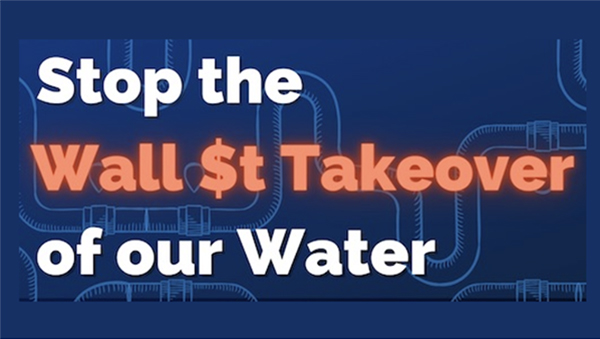Editors note: Let’s stop the water privatization plan. Communities need an infrastructure package that provides real money, not privatization scams with public-private partnerships and asset recycling.
Please read the letter below that has been sent to key members of the Senate.
Dear Majority Leader Schumer, Minority Leader McConnell, Speaker Pelosi, Leader McCarthy, Senate Budget Committee Chair Sanders, and House Budget Committee Chair Yarmuth:
We, the undersigned 218 organizations, oppose the Bipartisan Infrastructure Framework that promotes privatization, and we urge you to reject it and water privatization in all its forms and fight for a bold, uncompromising infrastructure package that provides real federal funding at the level our communities urgently need.
The outline of the latest bipartisan infrastructure framework would promote a slew of privatization activities. The proposed financing sources for new investment include public-private partnerships, private activity bonds, and asset recycling.1
That provision promotes a Wall Street takeover of essential services like public water. It is dangerous for the public and undermines public access to essential water services.
Water privatization is an incredibly expensive financing option. Privatization through public-private partnerships, private investment schemes or asset recycling is not a source of new funding, but an expensive and high-risk way to finance water projects. The typical water public-private partnership carries a cost of capital that can be five times the cost of the low-interest bonds available to municipal water systems.
Water privatization will lead to rate hikes on households already struggling to afford their water bills. Because the private entity recovers its financing costs and profit through user bills, privatizing water and sewer systems lead to considerable rate hikes for households and local businesses. Already, nearly one in three U.S. households struggles to afford their water and sewer bills, and households nationally have accrued billions of dollars of water debt during the pandemic. They cannot afford the price of privatization.
The problem at hand is that local government utilities rely almost exclusively on water bills to cover the cost of infrastructure projects because of the loss of federal support for water infrastructure. Federal funding has fallen by 77 percent in real terms since its peak in 1977. Local governments cannot continue to raise their water rates to levels that are increasingly unaffordable for households. Our public water utilities have a funding problem, not a financing problem. Privatization would only exacerbate the main problem facing our public water utilities.
Water privatization is not a viable or just solution for rural, small or disadvantaged communities. Private companies focus on profit maximization and avoid areas where per-household costs are high, the customer base has less wealth and bill collection problems can abound. A private company will acquire such a system if the system is contiguous to its existing network and if it can redistribute the costs across its other service areas. Because water rates are regressive, this type of subsidization is inequitable and disproportionately burdens working- and middle-class families across communities.
Water privatization can trap communities in expensive deals. Public-private partnerships that involve private financing are usually 30 to 40 years long, and they are extremely difficult to exit early. After taking office, the new municipal services director in Bayonne, NJ, posed as his first question: how do we get out of the city’s water concession contract? He was told the city would have to repay the $150 million concession fee that it no longer has. Since entering into a decades-long concession deal in 2012, Bayonne has experienced rate hikes of 50 percent despite promises of rate stabilization. According to the Hudson Reporter, a Board of Education Trustee recently told the new city council, “You didn’t sign the contract, and neither did the citizens of Bayonne, but everyone is suffering because of it.” Similarly, Middletown, PA, was unable to exit its water concession deal, and attempted to stop surcharges in court and lost.
Water privatization is not a solution for our nation’s water needs. Water privatization can increase costs, worsen service quality and allow infrastructure assets to deteriorate. There is ample evidence that maintenance backlogs, wasted water, sewage spills and worse service often follow privatization. In fact, poor performance is the primary reason that local governments reverse the decision to privatize and resume public operation of previously contracted services.
Communities need real federal dollars spent on drinking water and wastewater infrastructure. The most comprehensive funding solution on the table is the WATER Act m(HR1352, S916). The WATER Act would provide $35 billion a year to fully fund our water infrastructure at the level that is needed according to EPA needs surveys.
We urge you to reject this proposed water privatization scam and fight for a bold package that provides the support our communities need. Do not compromise on water.
Sincerely,
See listing of 218 organizations that have signed the above letter here: http://www.peoplestribune.org/latest-news/wp-content/uploads/2021/07/No-Water-Privatization-in-the-Infrastructure-Plan-2021-07-01-2.pdf
1 A public-private partnership is a type of privatization arrangement wherein a government contracts with a private entity to operate a government-owned infrastructure project, and it can involve managing, designing, building and financing a project. Private activity bonds provide tax benefits to support financing privatized projects. Asset recycling refers to selling or leasing off public infrastructure to finance another infrastructure project.
More info here:
https://www.inthepublicinterest.org/wp-content/uploads/ITPI_TrumpInfra_Feb2018.pdf#page=2
The typical water public-private partnership carries a cost of capital that can be five times the cost of the low-interest bonds available to municipal water systems. Water privatization will lead to rate hikes on households already struggling to afford their water bills.


